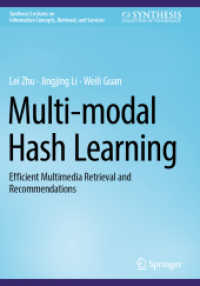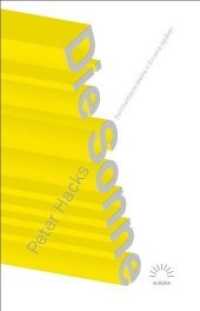- ホーム
- > 洋書
- > 英文書
- > History / World
Full Description
Usually remembered for its slogan "Tippecanoe and Tyler too," the election of 1840 is also the first presidential election of which it might be truly said, "It's the economy, stupid." Tackling a contest best known for log cabins, cider barrels, and catchy songs, this timely volume reveals that the election of 1840 might be better understood as a case study of how profoundly the economy shapes the presidential vote.
Richard J. Ellis, a veteran scholar of presidential politics, suggests that the election pitting the Democratic incumbent Martin Van Buren against Whig William Henry Harrison should also be remembered as the first presidential election in which a major political party selected—rather than merely anointed—its nominee at a national nominating convention. In this analysis, the convention's selection, as well as Henry Clay's post-convention words and deeds, emerge as crucial factors in the shaping of the nineteenth-century partisan nation. Exploring the puzzle of why the Whig Party's political titan Henry Clay lost out to a relative political also-ran, Ellis teases out the role the fluctuating economy and growing antislavery sentiment played in the party's fateful decision to nominate the Harrison-Tyler ticket. His work dismantles the caricature of the 1840 campaign (a.k.a. the "carnival campaign") as all froth and no substance, instead giving due seriousness to the deeply held moral commitments, as well as anxieties about the political system, that informed the campaign.
In Old Tip vs. the Sly Fox, the campaign of 1840 can finally be seen clearly for what it was: a contest of two profoundly different visions of policy and governance, including fundamental, still-pressing questions about the place of the presidency and Congress in the US political system.








